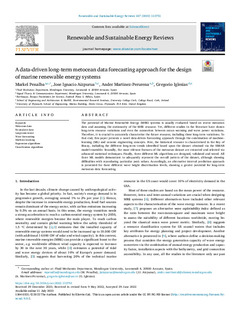Título
A data-driven long-term metocean data forecasting approach for the design of marine renewable energy systemsFecha de publicación
2022Otras instituciones
IkerbasqueUniversity College Cork
University of Plymouth
Versión
Version publicadaTipo de documento
ArtículoArtículoIdioma
InglésDerechos
© 2022 The AuthorsAcceso
Acceso abiertoVersión de la editorial
https://doi.org/10.1016/j.rser.2022.112751Publicado en
Renewable and Sustainable Energy Reviews Vol. 167. N. artículo 112751Editorial
ElsevierPalabras clave
Metocean data
Re-analysis data
Long-term trend
Wave forecasting ... [+]
Re-analysis data
Long-term trend
Wave forecasting ... [+]
Metocean data
Re-analysis data
Long-term trend
Wave forecasting
Machine learning
Regression algorithms
Classification algorithms [-]
Re-analysis data
Long-term trend
Wave forecasting
Machine learning
Regression algorithms
Classification algorithms [-]
Resumen
The potential of Marine Renewable Energy (MRE) systems is usually evaluated based on recent metocean data and assuming the stationarity of the MRE resource. Yet, different studies in the literature ha ... [+]
The potential of Marine Renewable Energy (MRE) systems is usually evaluated based on recent metocean data and assuming the stationarity of the MRE resource. Yet, different studies in the literature have shown long-term resource variations and even the connection between ocean warming and wave power variations. Therefore, it is crucial to accurately characterise the future resource, including these long-term variations. To that end, this paper presents a novel data-driven forecasting approach through the combination of machine-learning (ML) and oceanic engineering concepts. First, the historical resource is characterised in the Bay of Biscay, including the different long-term trends identified based upon the dataset obtained via the SIMAR model ensemble. Secondly, the most relevant features of the metocean dataset are extracted and selected via advanced statistical techniques. Finally, three different ML algorithms are designed, validated and tested. All three ML models demonstrate to adequately represent the overall pattern of the dataset, although showing difficulties with reproducing particular peak values. Accordingly, an alternative interval prediction approach is presented for three different wave height discretisation levels, showing a greater potential for long-term metocean data forecasting. [-]
Sponsorship
Gobierno Vasco-Eusko JaurlaritzaID Proyecto
info:eu-repo/grantAgreement/GV/Elkartek 2022/KK-2022-00090/CAPV/Codiseño de control de energías renovables flotantes/KONFLOTColecciones
- Artículos - Ingeniería [763]
El ítem tiene asociados los siguientes ficheros de licencia:






















